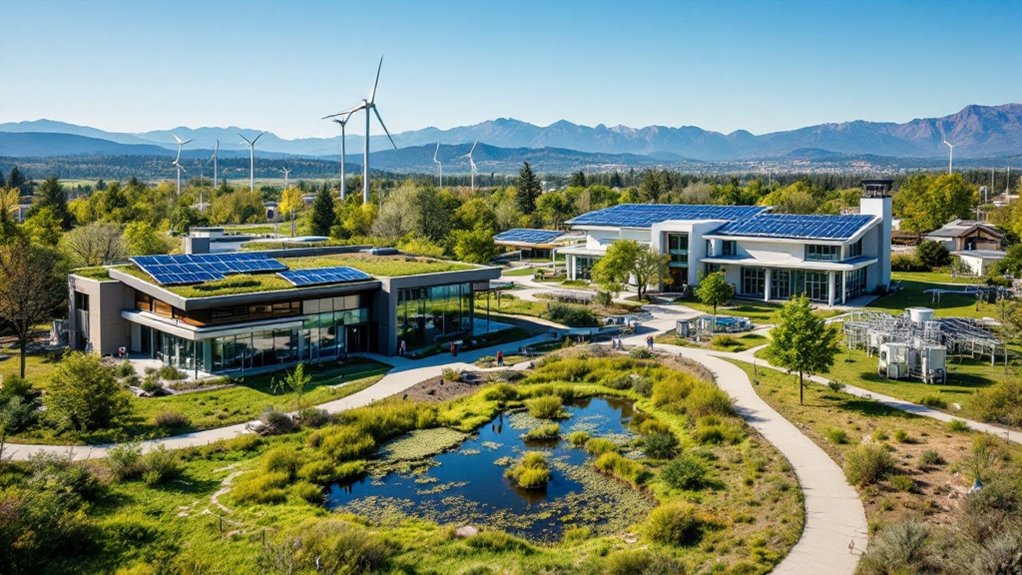Environmental sustainability degrees offer diverse career paths with promising job prospects. Graduates can work as sustainability consultants, policy analysts, renewable energy project managers, or corporate sustainability officers. Entry-level positions typically pay between $45,000-$60,000, with mid-career salaries reaching $70,000-$100,000. The job market shows strong growth, particularly in renewable energy where solar installers (22%) and wind technicians (68%) lead expansion. These programs equip students with valuable skills from GIS to environmental impact assessment.

As the world faces growing environmental challenges, environmental sustainability degrees have become increasingly popular among students. These programs offer diverse paths including Bachelor of Science in Environmental Science, Bachelor of Arts in Sustainability Studies, and advanced degrees like Master of Science in Sustainability Management. Students can also pursue a PhD in Sustainability Science for research-focused careers.
Environmental sustainability programs teach essential skills through core courses. Students learn about environmental policy, ecosystem management, sustainable energy systems, and environmental economics. Climate change adaptation strategies are also a key focus area in modern curricula. Many programs emphasize the concept of just sustainability that ensures quality of life for all within ecosystem limits.
Environmental sustainability education equips students with crucial skills in policy, ecosystems, energy, and economics for tomorrow’s climate challenges.
Graduates develop valuable skills employers seek. These include data analysis, Geographic Information Systems (GIS) proficiency, and environmental impact assessment. They also gain expertise in sustainability reporting and project management for green initiatives. Many programs provide hands-on training through fieldwork and real-world projects to build practical experience.
Career options for graduates are diverse and growing. Many work as sustainability consultants or environmental policy analysts. Others pursue careers as renewable energy project managers or corporate sustainability officers. Environmental scientist positions are also common for those with technical backgrounds. Emerging fields like carbon capture and geothermal energy are creating new job opportunities for sustainability graduates.
The salary potential in this field can be attractive. Entry-level positions typically pay between $45,000 and $60,000 annually. Mid-career professionals can earn $70,000 to $100,000, while senior-level positions often exceed $100,000. Sustainability Directors earn an average of $116,000, and Environmental Engineers have a median salary of $88,860.
Job growth in environmental sustainability is strong. Environmental scientists are expected to see 8% growth through 2030. More impressive growth is projected for renewable energy jobs, with solar photovoltaic installers at 22% and wind turbine technicians at 68%.
The field continues to evolve with new trends. Programs now incorporate artificial intelligence for environmental monitoring and focus on circular economy principles. Climate resilience, social justice aspects, and sustainable finance are becoming important components of sustainability education.
As companies increase their focus on Environmental, Social, and Governance practices, demand for qualified sustainability professionals will likely continue to grow.
Frequently Asked Questions
How Much Field Work Is Involved in Sustainability Degree Programs?
Sustainability degree programs typically include 25-50% field work. Students participate in hands-on activities like environmental sampling, ecosystem assessments, and renewable energy installations.
These programs often require 3-6 month internships and include field trips to various sites. While field work provides practical skills and career connections, it can present challenges.
Students may face physical demands, unpredictable weather conditions, and additional costs for equipment and transportation.
Can I Specialize in Renewable Energy Within an Environmental Sustainability Degree?
Students can specialize in renewable energy within environmental sustainability degrees. Many programs offer concentrations in solar, wind, geothermal, hydroelectric, or bioenergy.
Coursework typically includes renewable energy technologies, energy policy, and sustainable economics. These programs often partner with engineering departments for technical training.
Students develop skills in energy modeling, project management, and impact analysis. Graduates find work as project developers, policy analysts, consultants, and sustainability managers in the clean energy sector.
What Software Skills Are Most Valuable for Sustainability Careers?
For sustainability careers, data analysis software leads the pack in value. Excel, Tableau, and Python help professionals analyze environmental data.
GIS tools like ArcGIS and QGIS are vital for mapping environmental impacts.
Life cycle assessment software including SimaPro and GaBi measure product sustainability.
Reporting platforms such as Salesforce Sustainability Cloud and Sphera help companies track their environmental performance.
These skills aren’t just nice-to-have—they’re essential in today’s sustainability job market.
Are Online Environmental Sustainability Degrees Respected by Employers?
Online environmental sustainability degrees are increasingly respected by employers.
Studies show that 83% of executives view them as equal to traditional degrees. Accreditation matters more than delivery method.
Fortune 500 companies now regularly hire online graduates, who often see a 22% salary increase.
The stigma is fading as more universities offer online programs that maintain the same curriculum and academic standards as on-campus options.
How Do Sustainability Salaries Compare to Other Environmental Science Fields?
Sustainability roles often command higher salaries than traditional environmental science positions.
Top sustainability executives can earn $300,000+, while environmental scientists typically make around $73,230. Corporate sustainability managers and consultants generally out-earn field-based environmental roles.
However, specialized environmental careers like Natural Sciences Managers ($137,940) and Environmental Lawyers ($126,930) offer competitive compensation.
Geographic location, organization size, education level, and experience greatly impact earnings in both fields.









